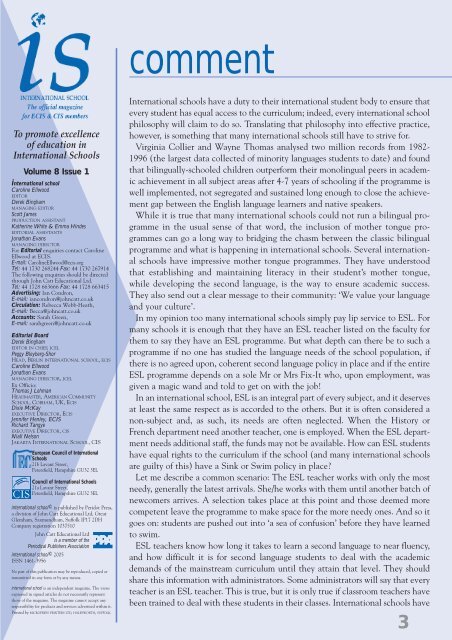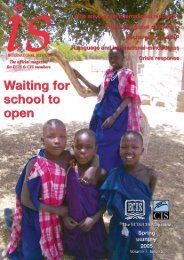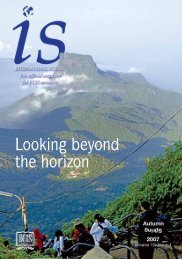is magazine 8.1 - Autumn/Spring 2005 - International Schools ...
is magazine 8.1 - Autumn/Spring 2005 - International Schools ...
is magazine 8.1 - Autumn/Spring 2005 - International Schools ...
You also want an ePaper? Increase the reach of your titles
YUMPU automatically turns print PDFs into web optimized ePapers that Google loves.
To promote excellence<br />
of education in<br />
<strong>International</strong> <strong>Schools</strong><br />
Volume 8 Issue 1<br />
international school<br />
Caroline Ellwood<br />
EDITOR<br />
Derek Bingham<br />
MANAGING EDITOR<br />
Scott James<br />
PRODUCTION ASSISTANT<br />
Katherine White & Emma Hindes<br />
EDITORIAL ASSISTANTS<br />
Jonathan Evans<br />
MANAGING DIRECTOR<br />
For Editorial enquiries contact Caroline<br />
Ellwood at ECIS.<br />
E-mail: CarolineEllwood@ec<strong>is</strong>.org<br />
Tel: 44 1730 268244 Fax: 44 1730 267914<br />
The following enquiries should be directed<br />
through John Catt Educational Ltd.<br />
Tel: 44 1728 663666 Fax: 44 1728 663415<br />
Advert<strong>is</strong>ing: Ian Condron,<br />
E-mail: iancondron@johncatt.co.uk<br />
Circulation: Rebecca Webb-Heath,<br />
E-mail: Becca@johncatt.co.uk<br />
Accounts: Sarah Green,<br />
E-mail: sarahgreen@johncatt.co.uk<br />
Editorial Board<br />
Derek Bingham<br />
EDITOR IN CHIEF, JCEL<br />
Peggy Bleyberg-Shor<br />
HEAD, BERLIN INTERNATIONAL SCHOOL, ECIS<br />
Caroline Ellwood<br />
Jonathan Evans<br />
MANAGING DIRECTOR, JCEL<br />
Ex Officio:<br />
Thomas J Lehman<br />
HEADMASTER, AMERICAN COMMUNITY<br />
SCHOOL, COBHAM, UK, ECIS<br />
Dixie McKay<br />
EXECUTIVE DIRECTOR, ECIS<br />
Jennifer Henley, ECIS<br />
Richard Tangye<br />
EXECUTIVE DIRECTOR, CIS<br />
Niall Nelson<br />
JAKARTA INTERNATIONAL SCHOOL, CIS<br />
European Council of <strong>International</strong><br />
<strong>Schools</strong><br />
21b Lavant Street,<br />
Petersfield, Hampshire GU32 3EL<br />
Council of <strong>International</strong> <strong>Schools</strong><br />
21a Lavant Street,<br />
Petersfield, Hampshire GU32 3EL<br />
international school© <strong>is</strong> publ<strong>is</strong>hed by Peridot Press,<br />
a div<strong>is</strong>ion of John Catt Educational Ltd, Great<br />
Glemham, Saxmundham, Suffolk IP17 2DH<br />
Company reg<strong>is</strong>tration 1037510<br />
John Catt Educational Ltd<br />
<strong>is</strong> a member of the<br />
Periodical Publ<strong>is</strong>hers Association<br />
international school© <strong>2005</strong><br />
ISSN 1461-3956<br />
No part of th<strong>is</strong> publication may be reproduced, copied or<br />
transmitted in any form or by any means.<br />
international school <strong>is</strong> an independent <strong>magazine</strong>. The views<br />
expressed in signed articles do not necessarily represent<br />
those of the <strong>magazine</strong>. The <strong>magazine</strong> cannot accept any<br />
responsibility for products and services advert<strong>is</strong>ed within it.<br />
Printed by MICROPRESS PRINTERS LTD, HALESWORTH, SUFFOLK.<br />
Winter<br />
comment<br />
<strong>International</strong> schools have a duty to their international student body to ensure that<br />
every student has equal access to the curriculum; indeed, every international school<br />
philosophy will claim to do so. Translating that philosophy into effective practice,<br />
however, <strong>is</strong> something that many international schools still have to strive for.<br />
Virginia Collier and Wayne Thomas analysed two million records from 1982-<br />
1996 (the largest data collected of minority languages students to date) and found<br />
that bilingually-schooled children outperform their monolingual peers in academic<br />
achievement in all subject areas after 4-7 years of schooling if the programme <strong>is</strong><br />
well implemented, not segregated and sustained long enough to close the achievement<br />
gap between the Engl<strong>is</strong>h language learners and native speakers.<br />
While it <strong>is</strong> true that many international schools could not run a bilingual programme<br />
in the usual sense of that word, the inclusion of mother tongue programmes<br />
can go a long way to bridging the chasm between the classic bilingual<br />
programme and what <strong>is</strong> happening in international schools. Several international<br />
schools have impressive mother tongue programmes. They have understood<br />
that establ<strong>is</strong>hing and maintaining literacy in their student’s mother tongue,<br />
while developing the second language, <strong>is</strong> the way to ensure academic success.<br />
They also send out a clear message to their community: ‘We value your language<br />
and your culture’.<br />
In my opinion too many international schools simply pay lip service to ESL. For<br />
many schools it <strong>is</strong> enough that they have an ESL teacher l<strong>is</strong>ted on the faculty for<br />
them to say they have an ESL programme. But what depth can there be to such a<br />
programme if no one has studied the language needs of the school population, if<br />
there <strong>is</strong> no agreed upon, coherent second language policy in place and if the entire<br />
ESL programme depends on a sole Mr or Mrs Fix-It who, upon employment, was<br />
given a magic wand and told to get on with the job!<br />
In an international school, ESL <strong>is</strong> an integral part of every subject, and it deserves<br />
at least the same respect as <strong>is</strong> accorded to the others. But it <strong>is</strong> often considered a<br />
non-subject and, as such, its needs are often neglected. When the H<strong>is</strong>tory or<br />
French department need another teacher, one <strong>is</strong> employed. When the ESL department<br />
needs additional staff, the funds may not be available. How can ESL students<br />
have equal rights to the curriculum if the school (and many international schools<br />
are guilty of th<strong>is</strong>) have a Sink or Swim policy in place?<br />
Let me describe a common scenario: The ESL teacher works with only the most<br />
needy, generally the latest arrivals. She/he works with them until another batch of<br />
newcomers arrives. A selection takes place at th<strong>is</strong> point and those deemed more<br />
competent leave the programme to make space for the more needy ones. And so it<br />
goes on: students are pushed out into ‘a sea of confusion’ before they have learned<br />
to swim.<br />
ESL teachers know how long it takes to learn a second language to near fluency,<br />
and how difficult it <strong>is</strong> for second language students to deal with the academic<br />
demands of the mainstream curriculum until they attain that level. They should<br />
share th<strong>is</strong> information with admin<strong>is</strong>trators. Some admin<strong>is</strong>trators will say that every<br />
teacher <strong>is</strong> an ESL teacher. Th<strong>is</strong> <strong>is</strong> true, but it <strong>is</strong> only true if classroom teachers have<br />
been trained to deal with these students in their classes. <strong>International</strong> schools have<br />
3




